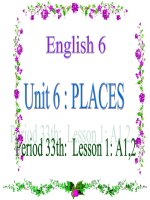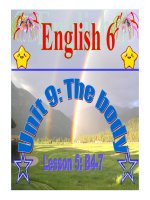slide bài giảng tiếng anh 6 unit 9 (REVIEW) a closer look 1,2
Bạn đang xem bản rút gọn của tài liệu. Xem và tải ngay bản đầy đủ của tài liệu tại đây (966.24 KB, 21 trang )
ENGLISH 6
Teacher: Dang Thi Bich
REVIEW UNIT 9
GRAMMAR.
Superlatives of adjectives and
the present perfect tense
( So sánh của tính từ và thì
hiện tại hoàn thành)
Grammar: 1. Superlatives of adjectives.
Long adjectives
* 2-syllable adjectives (not ending in -y)
* All adjectives of 3 or more syllables
Adjective
Superlative
a. Long
expensive the most expensive
adjectives
( Tính từ dài)
b. Short
adjectives
(Tính từ ngắn)
difficult
Rule
the most + adj
the most difficult
Ex: English is the most difficult subject.
tall
long
the tallest
the longest
the adj + est
Ex: I’m the tallest in my class.
Note: We add “the most” before long adjectives and the +
short adjectives + EST in the superlatives sentences.
Grammar: 1. Superlatives of adjectives.
FORM
Long
adjectives
Short
adjectives
S + to be + the most + adj + (Danh từ)
This hat is the most expensive.
Ba is the most intelligent student.
S + to be + the + adj + est + (Danh từ)
This ruler is the longest.
Peter is the tallest student.
This is the shortest film I’ve ever seen.
Lưu ý: TT 2 âm tiết kết thúc là “y” thì đổi y i rồi thêm est
VD: happy happiest
easy
easiest
Act 5. Complete the fact sheet by choosing one picture.
Compare your fact sheet with a classmate. Do you agree
with his/ her answer?
COUNTRY: BRITAIN
1. The biggest city: London
2. The oldest university:
3. The most popular British writer.
4. The most popular food:
5. The most popular drink:
6. The most common activity:
A
2. OLDEST UNIVERSITY:
A
B
3. MOST POPULAR BRITISH
B
WRITER:
Dickens
A
William Shakespeare
B
4. MOST POPULAR
A
FOOD :
A
FISH AND CHIPS
TEA
B
SPAGHETTI
4. MOST POPULAR
A
DRINK:
A
TEA
TEA
B
COFFEE
6. MOST COMMON ACTIVITY: B
A
PLAYING FOOTBALL
B
WATCHING TV
Act 6. Read and correct your answer.
London is the Britain’s biggest city.
Oxford University is the oldest university in Britain.It
was built in the 12th century.
The playwright William Shakespeare (1564 – 1616) is
the most popular British writer in the world.
Britain’s most popular food is fish and chips.
Tea is the most popular drink.
Britain’s most common leisure activities are watching
television and films and listening to the radio.
Act 5. Complete the fact sheet by choosing one picture.
Compare your fact sheet with a classmate. Do you agree
with his/ her answer?
1. The biggest city: London
2. The oldest university: University of Oxford
3. The most popular British writer: Shakespeare
4. The most popular food: fish and chips
5. The most popular drink: tea
6. The most common activity: watching TV
• Make superlative sentences with the fact
above.
1.The biggest city in Britain is London.
2. ……..
Practice 1. Write the correct form of the
following adjectives in the parentheses.
the best
1. I am ……………cook
in my house. (good)
the most popular
2. Tea is ………………………drink
in Viet
Nam. (popular)
the strongest
3. My elder brother is …………………person
in my family. (strong)
the most dangerous
4. What’s …………………………animal
in
your country? (dangerous)
the most beautiful
5. She is ………………………girl
in my class.
(beautiful)
Grammar:2.The present perfect tense.(thì hiện tại hoàn thành)
Have you ever
been to Nha Trang
?
Yes, I have.
I have been to Nha Trang 3 times.
She has visited Nha Trang many times.
They have not gone to Paris.
* FORM.
(+) I/ We/ You/ They/ Marry and Peter + have + PP…
He/ She/ It/ Peter + has + PP…
I/We/You/They/Marry and Peter + have +not+ PP…
(-)
He/ She/ It/ Peter + has + not + PP…
Have I/ we/ you/ they/ Marry and Peter + PP …?
(?) Has + he/ she/ it/ Peter + PP …?
Yes, S + have/has. /No, S +haven’t/ hasn’t.
Notes:(+) I/ We/ You/ They+ have = I/ We/ You/ They’ve
(+) He/ She/ It + has = He/ She/ It’s
(-) Have not = haven’t /Has not = hasn’t
PP = Past participle (V- ed / III)
* USES:
1. Diễn tả một hành động vừa mới xảy ra.
Ex: - He has just finished his homework.
- MU has won five games recently.
- They have developed a new product lately.
2. Diễn tả kinh nghiệm sống hoặc việc từng trải.
Ex: - Minh has gone to Da Lat twice.
- Have you ever climbed mount Everest?
- He has never seen a monkey before.
- We have not seen him yet.
- They have already finished their work.
3.Diễn tả một hành động bắt đầu ở quá khứ, kéo
dài đến hiện tại và có thể tiếp tục ở tương lai.
Ex: - We have studied English for 6 years.
- Nga has lived in Da Lat since 2010.
- They have sold 200 cars up to now.
Notes:
* SINCE + ĐIỂM THỜI GIAN (Kể từ ....)
Ex:- They have learnt English SINCE 2009
- She has changed a lot SINCE she came here.
* FOR + KHOẢNG THỜI GIAN (Được ...)
Ex: - We have worked hard FOR 6 months.
- They have learnt English FOR 4 years.
4.Diễn tả một hành động xảy ra trong quá khứ mà
không biết rõ thời gian/ không đề cập đến tgian.
Ex: - I’ve visited Ha Long Bay.
- He has seen this film.
- John hasn’t worked very hard.
5. Dùng trong cấu trúc This (It) is the first/ second
…time/ …
Ex - This is the first time he has driven a car.
- This is the second time Linda has lost her
passport.
- It’s the first good meal I’ve had for ages.
THE MARKERS( Những dấu hiệu) (dấu hiệu nhận
biết):
Thì Hiện tại hoàn thành thường đi với các trạng từ
sau:
- just(vừa mới), recently/ lately(gần đây),
already(đã, rồi), ever(đã từng), never(chưa
bao giờ), not…yet (chưa), twice, several times,
many times, for a long time (for ages: trong
thời gian lâu),...
- up to now/ so far/ until now/ up to the present
(cho tới bây giờ)
- This (It) is the first/ second …time…(Đây là
lần đầu/ thứ hai …..
- Since (dùng chỉ điểm thời gian)
- For (dùng chỉ khoảng thời gian)
Practice 2: Give the correct form of the
verbs.
haven’t
1. I can’t go with you as I (not finish)
finished
_____________ my homework yet.
2. They (study)have
____________ at this school for 7
studied
years.
ever seen
Have
3. _____ you (ever see) __________ a tiger ?
have learnt
4. They (learn) ___________ English since 1999.
has been
5. The weather (be) ____________ quite good
since Tet holiday.
have read
HOMEWORK.
• Learn by heart FORM and USES of Superlatives of
adjectives and The present perfect tense.
• Do Exercises in Workbook (Unit 9)









